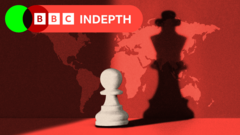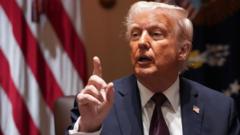**The article delves into the destabilization of traditional alliances, the potential emergence of a new geopolitical landscape, and Europe's urgent need for self-reliance in defense.**
**The Shifting Landscape of Global Security: Europe's Challenge in a Post-Trump Era**

**The Shifting Landscape of Global Security: Europe's Challenge in a Post-Trump Era**
**As the old world order crumbles, European leaders grapple with newfound security dilemmas following Trump’s presidency.**
The implications of Donald Trump’s presidency have left European leaders scrambling in the wake of a crumbling global order. Experts assert that the political landscape has fundamentally shifted, prompting Europe to reevaluate its security strategies. Gone are the days when the United States could be relied upon as the primary guarantor of European security, since Trump’s approach often contradicted the established norms of U.S. foreign policy.
Historical parallels can be drawn to post-World War II, when the U.S. assumed the mantle of leadership in global democracy following Britain’s decline. The Truman Doctrine marked a significant pivot towards American interventionism, seeking to contain communism through support for beleaguered allies. Fast forward to today, and Trump’s rhetoric mirrors a century-long critique of foreign commitments, suggesting that traditional alliances might now be at risk.
Under Trump's administration, a notable shift in tone emerged regarding NATO commitments. Statements made by high-level officials reflect a growing resentment towards European nations perceived as "free-loading," further exacerbating transatlantic tensions. Countries that once relied on American might now find themselves questioning the reliability of U.S. support, raising fears of a weakened NATO alliance.
Public sentiment in several European nations has shifted dramatically as well. Polls indicate a significant decline in trust towards the U.S. Among historically pro-American countries like France and the UK, citizens are increasingly skeptical, with majorities expressing concerns about the reliability of their erstwhile ally. This skepticism raises crucial questions about the future of shared security and defense arrangements.
The rise of European self-reliance in military spending has become a pressing agenda. Countries that slashed defense budgets in the years following the Cold War now realize the vulnerabilities that isolation has created. The urgent call for increased military expenditure is bolstered by a need to establish a sustainable defense funding model amid the potential decline of American leadership. Some policymakers are advocating for a "Europeanized" NATO that would enable the continent to operate independently from American-sanctioned frameworks.
Despite this urgency, achieving unity among European nations varies significantly, with Eastern and Western countries displaying divergent attitudes toward military investment. Historical debates surrounding defense spending have reinforced the need for a cohesive European strategy that prioritizes an indigenous military-industrial base. This approach contemplates not only the procurement of necessary defense technologies but also addressing the logistical challenges associated with military recruitment across the continent.
As Trump’s influence remains palpable, analysts assert that his form of populism and nationalism may have consequences that extend beyond his presidency. The potential fragmentation of Western alliances could lead to unprecedented geopolitical shifts, as Trumpism continues to inspire a reconsideration of established norms among both allies and adversaries.
From fostering internal military capabilities to re-evaluating foreign alliances, the stakes are high for European leaders as they navigate the complexities of a multipolar world. The challenge lies not just in countering immediate threats but also in fortifying a collective vision for a resilient and unified Europe in an era characterized by uncertainty and shifting allegiances.




















